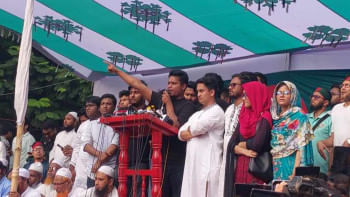WB to give $120m to upgrade connectivity
The World Bank will provide $120 million to Bangladesh to develop infrastructure in the bordering areas, which will upgrade regional connectivity and increase trade under the BBIN initiative.
The government will have to take this initiative as the four BBIN nations -- Bangladesh, Bhutan, India and Nepal -- agreed upon regional multimodal connectivity, Commerce Minister Tofail Ahmed told journalists at his secretariat after a meeting with WB Country Director Qimiao Fan in Dhaka.
"Once the BBIN is in place, the transportation of goods among the four nations would be easier as each country agreed to allow the use of other's territories to carry goods," the minister said.
The BBIN deal, which was signed last year in Bhutanese capital Thimphu, will come into effect once Bhutan ratifies the agreement in its parliament; the other three nations have already done so.
Fan said the Bangladesh Regional Connectivity Project-1 will help Bangladesh reduce time and cost of regional trade. The project that is now under preparation has a number of components, he said.
Firstly, the project will support investment to improve a couple of land ports that are under the shipping ministry and will support the National Board of Revenue to set up a government wide single window for trade.
The project will also improve the capacity of traders by providing support and services to them.
The scheme will also support the national trade and transport facilitation committee, Fan said.
"We hope, through this project, we can help enhance regional integration through trade, transport, power trade as well as other aspects of regional integration," he said.
Fan said Bangladesh is now the WB's concessionary arm for International Development Association (IDA) and is the largest IDA recipient across the world.
"So, obviously, Bangladesh is an extremely important partner for World Bank. At the moment, we have a total investment commitment of just under $10 billion in active investment projects in the country," Fan said.
He said the Bangladesh government has been implementing a lot of projects in many areas like education, health, social protection, agriculture and the financial sector.
"So, a wide range of areas, that we are providing financing to, support the projects that the government sees as priority. We bring just not financing, we can also bring in experience from other countries," he said.
Regarding the country's development progress, he said Bangladesh itself is a successful development story in many ways.
"Bangladesh has a lot to offer to the rest of the world in terms of its development achievements. Very often, I am amazed to see the country with so many people with such little land has been able to feed all its people today."
The country saw no famine since 1974 and that is a remarkable achievement beyond food security.
Bangladesh has also made tremendous progress in terms of poverty reduction, human development, particularly in gender equality in education.
Bangladesh aspires to be a middle income country in a few years, and clearly to get to the level, the country will have to face a number of challenges, said Fan.
The country has been facing challenges in infrastructure, particularly in energy. "I think it has become a binding constraint to further growth in the country."

 For all latest news, follow The Daily Star's Google News channel.
For all latest news, follow The Daily Star's Google News channel. 



Comments